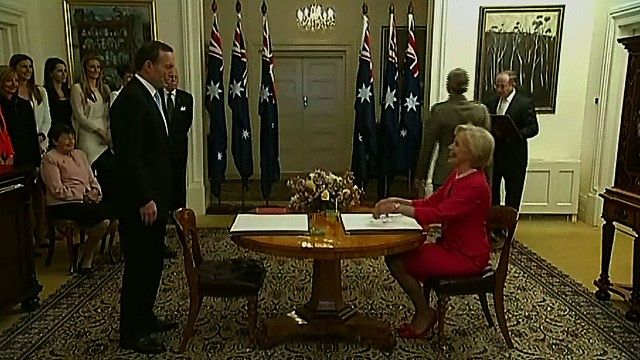Tony Abbott has been sworn in as Australia’s prime minister after his Liberal-National coalition ended six years of Labor government.
Tony Abbott, 55, took the oath at Government House in Canberra in front of Governor-General Quentin Bryce.
His conservative coalition won a comfortable lower house majority in the 7 September polls.
It plans to scrap a tax on carbon emissions introduced by Labor and further toughen asylum policy.
Ahead of Wednesday’s ceremony, Tony Abbott said his government would get to work immediately.
“Today is not just a ceremonial day, it’s an action day,” he said.
“The Australian people expect us to get straight down to business and that’s exactly what this government will do.”
The new ministers were also being sworn in during the day. His 19-member cabinet line-up has caused debate because it contains only one woman, new Foreign Minister Julie Bishop.
Tony Abbott, however, says his cabinet is “one of the most experienced incoming ministries in our history”.
The new prime minister said on Tuesday that the carbon tax would be his first task.
“As soon as I return to Parliament House from the swearing-in ceremony, I will instruct the Department of Prime Minister and Cabinet to prepare the carbon tax repeal legislation,” he said in a statement.

He says the carbon tax – which makes Australia’s biggest polluters pay for emissions over a certain amount – cost jobs and forced energy prices up.
Instead of the tax, he plans to introduce a “direct action” plan under which subsidies will be given to farmers and businesses to reduce their emissions.
The position of science minister and a fund providing loans for green technologies are to be scrapped. Two official bodies related to climate change are also expected to be closed, local reports say.
The moves that has prompted criticism from Australia’s chief scientist, Professor Ian Chubb. “These sorts of issues are not going away just because we ignore them,” he told the Australian Broadcasting Corporation.
The new prime minister also says tough new policies to end the flow of asylum-seekers arriving in Australia via Indonesia will come into effect today.
Under a Labor policy, all asylum-seekers arriving by boat are being sent to Papua New Guinea for processing and resettlement if found to be refugees.
Tony Abbott is maintaining this policy and has promised to “stop the boats” – turning them back to Indonesia where safe to do so, a policy over which Indonesia has voiced concern.
He is expected to place the deputy chief of the army in charge of combating people smugglers, and his government will also restrict refugees already in Australia to temporary protection visas which must be regularly renewed.
Rights groups have criticized both the previous and incoming governments’ policies on asylum.
But – with some votes still to be counted from the September 7 election – it appears that the coalition will not control the Senate, meaning it may struggle to pass key legislation.
It is expected that the new government will have to work with several minor parties to get bills passed in the upper house.
The Labor Party, meanwhile, is in the process of choosing a new leader, with both former deputy prime minister Anthony Albanese and powerbroker Bill Shorten vying to replace Kevin Rudd, who is stepping down.
[youtube dVCainjkroI]
